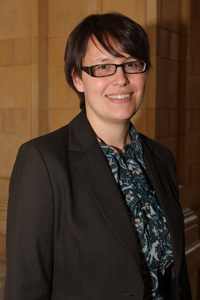 Michelle Meagher, Assistant Professor in the Women's Studies Program since 2007, is opening up her classroom to the public this week during the Festival of Teaching. Meagher, a recent winner of a Faculty of Arts Undergraduate Teaching Award (Early Achievement), shared with us her thoughts about what makes a great teacher.
Michelle Meagher, Assistant Professor in the Women's Studies Program since 2007, is opening up her classroom to the public this week during the Festival of Teaching. Meagher, a recent winner of a Faculty of Arts Undergraduate Teaching Award (Early Achievement), shared with us her thoughts about what makes a great teacher.
What do you feel are the qualities of a good teacher?
I think a good teacher is somebody who is interested in her students, interested in the material she's teaching, passionate about field and the materials she's teaching, and passionate in the research that she's doing. But one of the important things is to be interested in what students have to say, how students respond to material and how students' questions can transform our own thinking about the material that we're working with together.
How do you prepare for your classes?
I come with notes, I come prepared with things to say, but I also come with lots and lots questions. I spend a fair amount of time building a classroom environment where students feel free to reflect on and experiment with my questions. We need to have some structure, but I like for there to be a lot of freedom. I'm most excited by a classroom when I leave having been asked a question and thought about something in a brand new way.
Tell me about the Festival Class you'll be teaching.
It's Women's Studies 320 - Popular Culture, Feminist Culture. I see my job there as facilitating students' thinking about their own engagements with popular culture. I'm trained in cultural studies and I know a lot of the history of intellectual engagements with popular culture and feminist explorations of popular culture. But I don't know anything about popular culture of the last year or two, which is what my students are experts in. It's my job to help them think about how their experience of popular culture can be broadened and deepened if we think about the history of feminist and other scholarly engagement with pop culture. We have a different kind of expertise, and how do we bridge our two positions? I know a lot, they know a lot, they can teach me a lot, I can teach them a lot.
For anyone who hasn't taken a women's studies class before, or a popular culture class, can you tell me how those two topics influence each other?
In the most general sense, women's studies is a field that trains students to develop critical thinking skills around how gender and systems of privilege and oppression affect our everyday lives. In the popular culture class, we ask questions about how those things are represented in popular culture -television, film, music, social media. We're interested in how women are represented, and how different women are represented in different ways, and how representations of women shift historically.
One of the really big questions we also ask is how feminist scholarly engagements with popular culture have shifted over the last 40 years, and how these shifts have changed how popular culture is studied. We start the class by looking at the history of the study of popular culture, and then we spend a fair amount of time looking at what we call "women's genres" - soap operas, romance novels, and the feminist study of romance novels. We move all the way up to contemporary popular culture, and we have sections on romance reality TV, domesticity in cooking shows and the politics of lesbian representation in Showtime's drama, The L-Word.
Do you have any other methods you use to engage students?
Another method I have for engaging students is aimed at those students who don't necessarily feel comfortable talking in class. I was one of those - it was just too scary - so I always think about those students as well. One of the strategies I have for engaging students is doing lots of small, "low-stakes" writing - short papers - throughout the semester. They are response papers, they are asking students to tell me what they've learned, what they're thinking, what they don't understand and what they do understand. I read their work and I comment, so I have a conversation with the student through her paper.
In my senior seminar, we meet twice a week. On the Tuesday, students bring response papers, on the Wednesday I read them, and on the Thursday I offer a small lecture based on what I read in response papers. My classes are structured around students' engagement. For me, the perfect seminar is one where, at the end of the seminar, they do it all themselves. I love that moment when students start asking questions of one another. I am there in the background and can offer some expertise, but they're having the conversation.